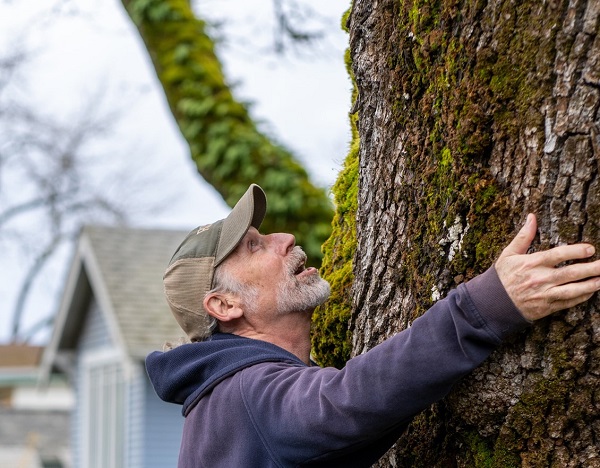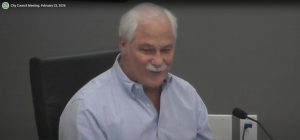Meaningful local climate action: The easy part
6 min read
by Ted M. Coopman
Given Eugene’s limited resources and regulatory power, as well as potential public and industry opposition, there is only so much we can do to address climate change. The good news is we have some solid options with a good chance to build the required support essential for meaningful action.
Tackling large and complex problems like climate change can feel overwhelming. It is easy to feel powerless, believing that individual efforts are inconsequential. You might think, “It’s not my responsibility. Let someone else make the sacrifices.” It’s also easy to point accusing fingers at evil fossil fuel companies (like NW Natural), gas leaf blowers, or oblivious neighbors driving carbon-spewing SUVs. However, shifting blame solves nothing.
Mirror, mirror on the wall, who is the most responsible of all?
If you really want to know the prime villain for climate change, look in the mirror. Our modern life is built on carbon-based fuels, and we have what we have because of it. The U.S. is the largest producer of oil and natural gas. Even if you drive an EV, have solar panels, and an all-electric house, all the component parts got to you via carbon-spewing processing and transportation. The food we eat, the items we buy, and services we get all require the burning of fossil fuels. We all benefit, and we all pay in the destruction caused by climate change. Moreover, our modern American economy and lifestyles disproportionally impact poorer people around the globe. That leaves us with both the ability and responsibility to act.
Don’t mourn, mobilize!
I have been an activist for 30+ years and have researched and taught courses on collective action. Activists have a duty to pragmatism if they are more serious about results than mere performance. With limited resources we need to be intentional so that the effort expended has the maximum impact. We must build support for action, recognize where opposition will emerge, and understand the opposition might thwart mobilization. We must not merely do something, we must do something effective.
Eugene’s natural gas ban for new construction is a good example of failing the effectiveness test. First, its impacts, even by its advocates’ analysis, would be negligible even over the span of many years. Second, it was viewed as the first step toward a forced natural gas phase-out, an idea that was not lost on those who use or depend on natural gas, ensuring a conflict. Third, the reaction by NW Natural, a well-funded opponent faced with an existential threat, was predictable. A natural gas ban was sure to go to a ballot initiative and the ban likely would have lost, if for no other reason than the City Council failed to put it to voters. Voters generally do not like that. The result was wasted resources and time, which we do not have, and nothing to show for it except further distrust of government and its activist allies.
It is pointless to the level of political malpractice to push policy that is likely to generate serious opposition and years of delay for a negligible impact on emissions. We need to focus on acceptable and potentially popular measures while working to get skeptics on board. This begins by understanding that (1) a vast majority of people realize the threat of climate change and (2) people are willing to make changes and sacrifices if they create observable results, share the burden, and are not an existential threat to the local economy.
Luckily, there are actions we can take immediately, with immediate results, that benefit many directly, make sense broadly, require minimal and evenly distributed pain, and are supported by science and behavioral economics.
First the easy part: Trees!
I have written in depth on the benefits of trees, particularly on their positive climate impacts, in All we are saying, is give trees a chance. In a nutshell, alongside many other social and environmental benefits, trees deliver sustained and economical carbon sequestration while cleaning our air. Trees also reduce surface temperatures and lower cooling costs for the structures they shade. Trees are cheap to plant and cheap to keep. For these reasons alone, we should put the preservation of trees first, instead of last.
Despite what most people think, Eugene has poor tree protection ordinances. Housing advocates think cutting a tree or three down to make room for housing is a great trade. It’s not. People build homes around trees all the time (not to mention a mature tree adds over $10K to a home’s value).
Sadly, in the short term, it is cheaper and easier to level a lot and build a cookie-cutter home. However, the “savings” for tree removal are a mirage compared to the tree’s benefits. As with most commercial development, it is less about creating housing and more about creating profit. However, government agencies also are culprits and quick to remove trees if it makes a job easier.
Mass transit is another culprit in tree removal as trees are viewed as an impediment. Advocates were apoplectic over Jefferson Westside neighbors fighting the construction of an EmX line on West 11th Avenue that would have required clearcutting hundreds of mature trees and shaving 10+ feet off homeowners’ front yards. As I have discussed, no amount of mass transit use for an EmX line would make up for the amount of carbon-intensive concrete poured and with the loss of those trees.
While removing mature carbon-absorbing trees often is accompanied by the planting of new trees, those new trees, providing they survive, will not produce the same benefits for decades. Conversely, the long road to significant impacts means that we need to plant a lot of trees now as it will be 2050 before we can reap the benefits. Bottom line is that you can’t move a mature tree, but you can move built infrastructure.
The City Council has the ability to take immediate action to stop the loss of significant trees. The city already is expanding its urban forest through partnerships with Friends of Trees. Such an effort is the low-hanging fruit of climate mitigation and good place to start, but the most promising two paths forward will involve a bit more sacrifice.
Image: The author hugging a bigleaf maple in front of his home. Learn more about trees at www.friendsoftrees.org, 541-632-3683, and check out the Friends of Trees / Jefferson Westside tree proclamation from Fall 2019.
Western Exposure is a semi-regular column that looks at issues and challenges from a West Eugene perspective – a perspective that is often ignored or trivialized by city leadership and influential groups and individuals largely based in south and east Eugene.
Western Exposure rejects the fauxgressive party line, performative politics, and “unicorn ranching” policy in favor of pragmatism focused on the daily experiences of residents and small businesses in Eugene—and West Eugene in particular.
Ted M. Coopman has been involved in neighborhood issues since 2016 as an elected board member, and now chair, of Jefferson Westside Neighbors and has 30+ years experience as an activist and community organizer. He earned a Ph.D. in Communication (University of Washington) and served on the faculty at San Jose State University from 2007 to 2020.
Ted’s research on social movements, activist use of technology, media law and policy, and online pedagogy has been published and presented internationally and he taught classes ranging from research methodology to global media systems. He and his spouse live in Jefferson Westside with an energetic coltriever and some very demanding and prolific fruit trees.




